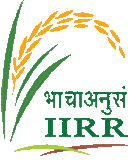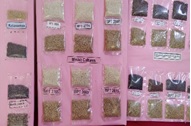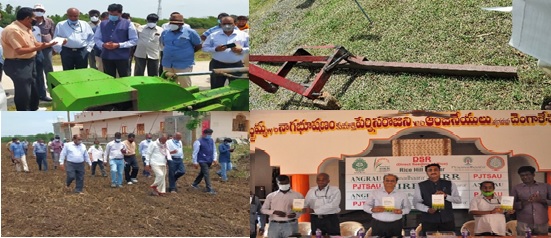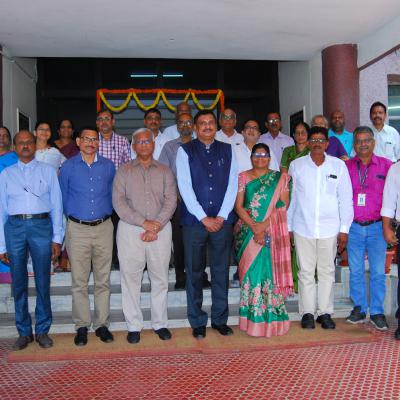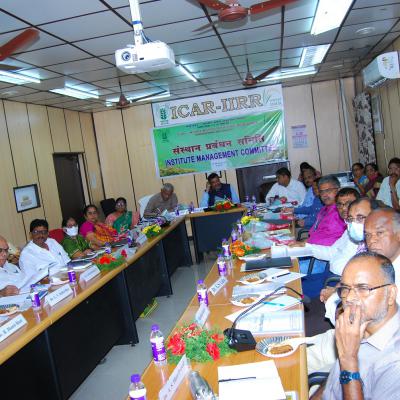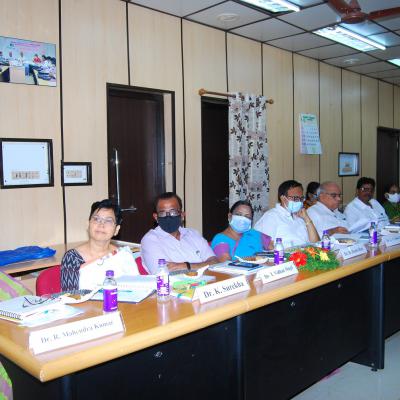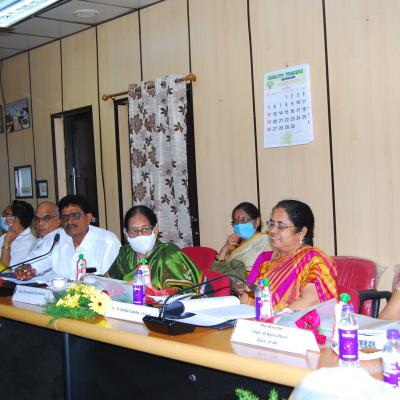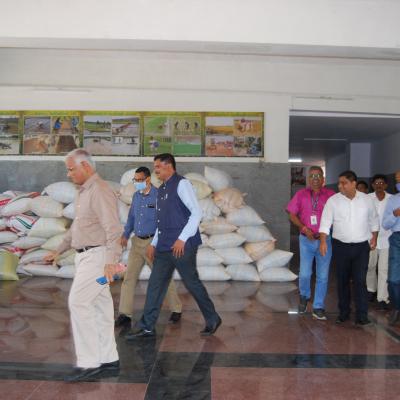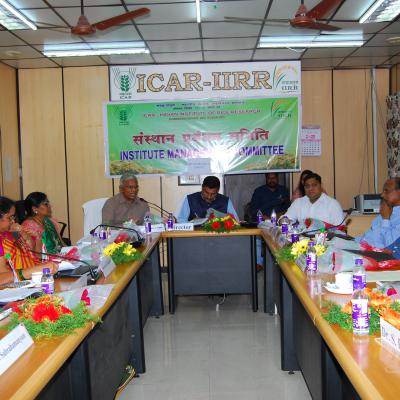Field Visit to Baptla, Andhra Pradesh to monitor AICRIP trials and oversee large-scale adoption of mechanised Direct Seeded Rice (DSR) 29th July 2021
On 29-07-2021, a team from ICAR-Indian Institute of Rice Research, Hyderabad, consisting of the following members visited, Agricultural Research Station (ARS), Bapatla to monitor conduct of AICRIP trials and also a nearby village, Cheruvu Jammulapalem to oversee large scale adoption of mechanised DSR.
1. Dr. R. M. Sundaram Director, ICAR-IIRR Hyderabad.
2. Dr. R. Mahender kumar, P.S.& PI Crop production
3. Dr. A. V. S. R. Swamy Principal Scientist, Plant Breeding
4. Dr. P.Muthuraman P.S & Head, TTT.
5. Dr. Y. Sreedhar Principal Scientist, Entomology.
5. Dr. P. Senguttuvel Sr.Scientist Hybrid Rice
At ARS, Bapatla the above mentioned team met Dr. Rama Rao, Station In-charge, Dr. Krishnaveni, Sr. Breeder and Dr. Suneetha, Breeder and enquired about status of AICRIP trials. It was informed that the seeds from all the trials in breeding have been received and sown and almost all lines germinated successfully. The team also visited mini-museum of rice in the research station and was informed about the historical achievements of the research station, including the development of release of the mega-variety of rice, Samba Mahsuri (BPT5204) and other recent achievements in terms of development and release of improved versions of indigenous black rice lines. Recently four very high-yielding, medium slender grain type varieties have been developed and released, viz., BPT 2295, BPT 2595, BPT-2411 and they have recorded yields of > 7.5 t/ha in farmers’ fields. Further, few more improved breeding lines with medium-slender grain quality and high yield are in the pipeline for release. The centre is maintaining traditional and improved versions of indigenous and black rice lines and these include BPT-2841, BPT-2848, BPT-3145 BPT-3137, which are having high Zinc and iron content. The team also visited the field plots of the research station, and observed that all the recommendations of technical programme have been followed scrupulously and saw excellence maintenance of dry nursery plots.
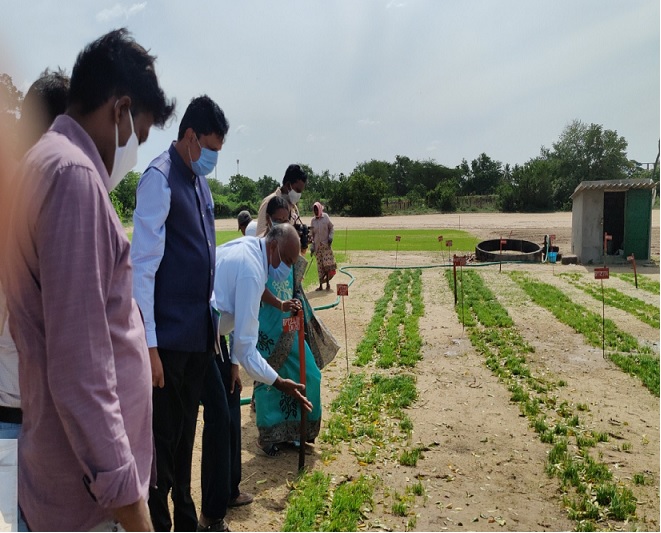 |
collection of indigenous and improved rice variety at ARS, Bapatla |
|---|
After the visit to ARS, Bapatla, the team proceeded to Cheruvu Jammulapalem village, Baptla Taluk, Guntur District, Andhra Pradesh to oversee the large-scale adoption of Dry Direct Seeding of Rice (DDSR) and Alternate Wetting and Drying method (AWD) of irrigation in a large area of more than 20,000 ha. The adoption is facilitated by Praanadhaara, NGO organisation which is widely helping the farmers in adopting modern agricultural practices including customized mechanization. In the field visit programme, many farmers from nearby villages and experts from, ARS, Baptla, Acharya NG Ranga Agricultural University, Guntur and NGO representatives participated.
Dr. Pundarekakshudu, President, Praanadhara explained about the customized design and intensive use of various agricultural farm implements, whose operations were demonstrated to the team. He emphasized the need to use of customized machinery in DDSR and AWD and other farm operations, which are being practised in many villages where Praanadhaara is very active. All operations and processes in rice farming from sowing to harvesting is completely mechanized. The Team explained and demonstrated various good agricultural practices to be followed in raising a healthy and high-yielding crop in the field. During the visit of the team from ICAR-IIRR, complete mechanized field preparation, sowing, compaction of soil after sowing and weedicide application were demonstrated in an area of 6000 acres.
An interface meeting between farmer, Scientists and Other NGO representatives interface meet was held during the visit. Dr. R. M. Sundaram, Director ICAR-IIRR commended the farmers in actively coming forward to adopt modern agricultural practices including mechanization, thus moving towards sustainable rice farming and emphasized the need of cultivating nutrient enriched bio-fortified rice varieties for the benefit of health under mechanized operations so that farmers can earn more money from rice cultivation. He assured the support of ICAR-IIRR for upscaling the technologies and cooperation in future activities of the NGO and released a Folder of Pranaadhaara entitled “Sustainable Rice Framing”. The other members of the team from ICAR-IIRR, shared their knowledge on rice cultivars (Dr. Swamy) Integrated Pest Management (Dr. Sreedhar) Hybrid Rice and Aerobic rice (Dr. Senguthuvelu ), Out-reach programmes (Dr. Muthu raman) and Package of practices, water saving by AWD and N management by Leaf colour Chart (Dr. Mahendra Kumar). Dr. Joseph Reddy, ANGRAU, Guntur explained the need for developing complete, customized mechanization solutions in rice to make rice farming not only sustainable, but also profitable by saving significant costs in cultivation.
|
|
|---|
Field visit of team from ICAR-IIRR, to Cheruvu, Jammulapalem village, Bapatla Taluk, Guntur District, Andhra Pradesh and overseeing of mechanized Dry-Direct seeded Rice (DDSR) carried out the NGO, Praaanadhaara
